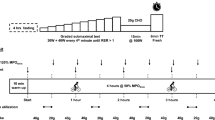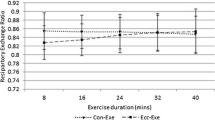Abstract
The aim of this study was to examine whether the increase in the energy cost of running (Cr), previously reported to occur at the end of a prolonged run, could be influenced by the ingestion of either an artificially sweetened placebo (Pl) or a 5.5% carbohydrate (CHO) solution. Ten well-trained triathletes completed three testing sessions within a 3-week period. The aim of the first session was to determine maximal oxygen uptake (V˙O2 max) and the velocity associated with ventilatory threshold (νVT). The second and the third sessions were composed of two submaximal treadmill runs (20 min long, 0% grade, performed at νVT), before and after an 80-min overground run, also conducted at νVT. During these submaximal tests, the subjects ingested (in a random order) either a Pl or CHO solution prior to the first submaximal run and every 20 min after that. During the first session, ventilatory threshold (VT) occurred at [mean (SD)] 81.2 (2.5)% V˙O2 max and 16.5 (0.6) km · h−1. A significant effect of exercise duration was found on Cr (ΔCr) at the end of the run, whatever the solution ingested (ΔCr= 5.7% and 7.01% for CHO and Pl, respectively). A reduction in the respiratory exchange ratio (from 0.98 to 0.90) was observed only at the end of the Pl trial. In this study, Cr seems to be affected only to a minor extent by substrate turnover. Moreover, the increase in the demand for oxygen, estimated from the increase in ventilation, accounted for only a minor proportion of the increase in Cr (11% and 17% for CHO and Pl, respectively). No correlation was found between the changes in Cr and the changes in the other physiological parameters recorded. These results suggest, indirectly, that Cr increases during a 2-h run at 80% V˙O2 max in well-trained subjects can be explained mainly by alterations in neuromuscular performance, which lead to a decrease in muscle efficiency.
Access this article
We’re sorry, something doesn't seem to be working properly.
Please try refreshing the page. If that doesn't work, please contact support so we can address the problem.
Similar content being viewed by others
Author information
Authors and Affiliations
Additional information
Accepted: 29 June 1999
Rights and permissions
About this article
Cite this article
Brisswalter, J., Hausswirth, C., Vercruyssen, F. et al. Carbohydrate ingestion does not influence the change in energy cost during a 2-h run in well-trained triathletes. Eur J Appl Physiol 81, 108–113 (2000). https://doi.org/10.1007/PL00013781
Issue Date:
DOI: https://doi.org/10.1007/PL00013781




